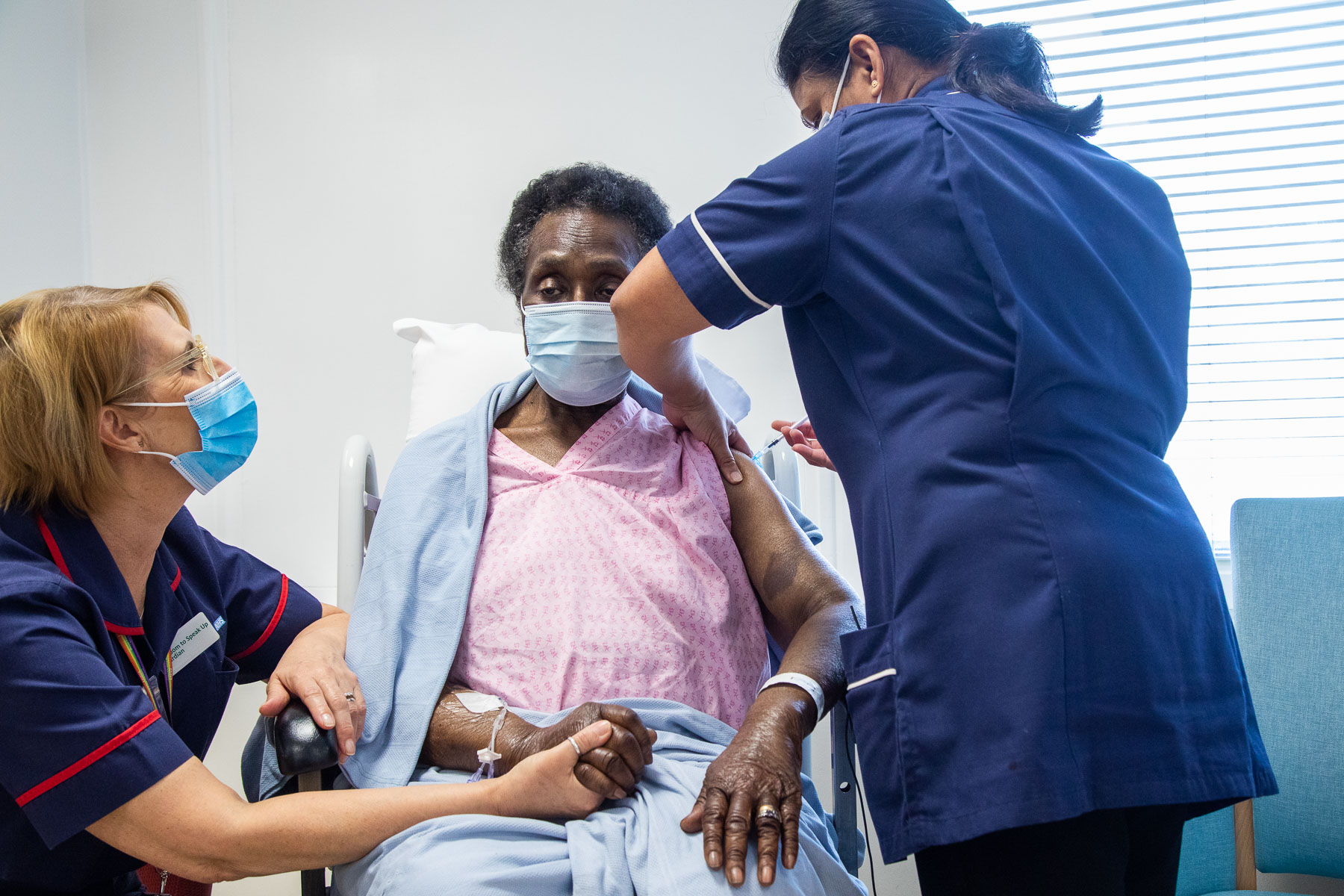First V-Day vaccines are ‘great… but not a silver bullet’, warn virus experts
Independent advisers say that immunity from jabs could start to wane after just six months
Thursday, 10th December 2020 — By Richard Osley

Josephine Faleye became the first patient to have a Covid-19 vaccination at the Royal Free Hospital on Tuesday
TRIUMPHANT celebrations over how the UK ‘won the coronavirus vaccine race’ have been tempered by warnings that immunity may fade within six months of having the jab and that the disease could always be circulating in some form.
Experts who formed an independent advice panel to track and scrutinise the course of the Covid pandemic said control measures would be needed for many more months despite the start of vaccinations.
The discussion by members of the independent SAGE [Scientific Advisory Group for Emergencies] on Friday clashed with the tone of this week’s national news coverage, which saw camera crews outside hospitals, a man called William Shakespeare pictured receiving one of the first vaccine doses in Stratford and the Health Secretary Matt Hancock apparently sobbing with emotion on breakfast television. “It makes you proud to be British,” said Mr Hancock on Good Morning Britain, who labelled the first injections as ‘V-day’.
The first vaccine to enter circulation is the Pfizer-BioNTech jab, which needs to be refrigerated at minus 70 degrees, and healthcare workers and over-80s were invited to take part in initial vaccinations. Next year, the Oxford University-Astra Zeneca vaccine will also be brought into use as part of the largest vaccination programme the country has ever seen.
But the debate over whether this will be a one-off jab or needed like the seasonal winter flu injection goes on.
The independent SAGE was positive about its arrival and encouraged take-up, but Professor Deenan Pillay, a professor of virology at UCL, said: “Already there’s talk about the need for these immunisations every year if there is waning immunity and therefore, if we’re talking about six months from now, it may be that immunity is starting to wane and there will still be the virus circulating. That would undercut the idea of herd immunity and elimination.”
The professors and scientists on the independent body, which mirrors the government’s own SAGE group, said that while the vaccines may stop deaths, it is not known yet if they will halt transmission of the virus.
Professor Pillay said “government ministers were making wildly inappropriate comments about the brilliance of the UK: how we were ahead of the world and even that we could only do this because of Brexit.”
He said that the Pfizer jab had been partly the work of a Turkish scientist in Germany working with a US company.
SEE ALSO GRANDMOTHER IS FIRST ROYAL FREE PATIENT TO HAVE COVID VACCINE
Professor Karl Friston, a neuroscientist at UCL, said: “One should remember that even with diseases with a fantastic vaccine like measles… we still have very large outbreaks.”
He added: “The vaccine is great, it’s going to make a big difference but it’s not going to be the whole answer. There is no silver bullet.”
Professor Friston told the online question and answer session: “The best you can hope for is a deferment of a seasonal wave. It is certainly not going to go away. What that means is that we’re back to where we were several months ago. The only way to achieve community suppression and get back to ‘normal’ is through public health measures and crucially the test, trace and isolation.”
Anthony Costello, a former World Health Organisation adviser, said that he thought that it was “inevitable that we’re going to surge again – probably by Christmas and New Year,” adding: “We need test, trace and isolate, but everyone focuses on testing and actually that’s the least important part. Of course you can get tests, but the key thing is you want to know how many people are isolating.”
He said that those with lower incomes would need more than a £500 payment to stay at home for two weeks.
“We’ve lost 15,000 plus people since the government refused to put in a circuit breaker at the end of September. We don’t know how many of those deaths could have been avoided but I think a very substantial number,” Mr Costello added. All of the independent experts said they themselves would take the vaccines when offered, but that work was needed to encourage uptake.
“The vaccine hesitant are not the same as anti-vaxxers,” said Professor Stephen Reicher, from the University of St Andrews. “Anti-vaxxers are against vaccines come what may and no information will change their minds. But there are many people who have questions and they’re quite right to have questions.”
He added: “I think the first thing is to treat people with questions with respect, not as a problem but as an opportunity to lay out the information.”
The government’s own chief scientific adviser Sir Patrick Vallance said this week that people could still have to wear face masks throughout next year.
“We don’t know yet how good all the vaccines are going to be at preventing the transmission of the virus,” he said.